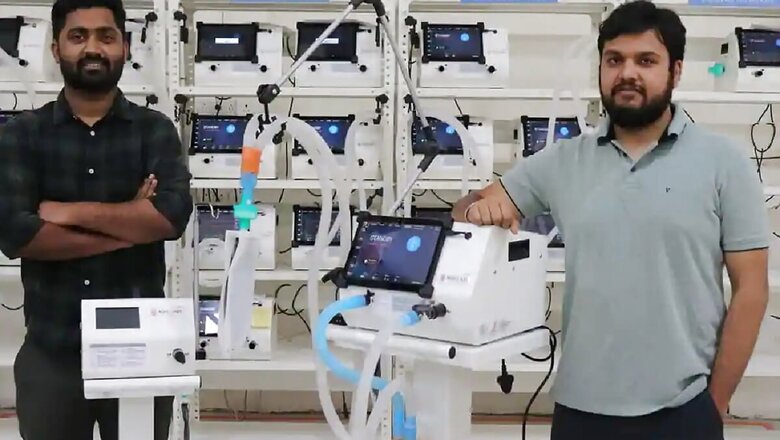
views
Covid-19 brought the underlying issues to the forefront, and showed glimpses of the magic that’s possible when the role of the government becomes ‘minimum’ and it instead focuses on being a strong facilitator through ‘maximum governance’. As co-leads of a twenty-member task force that helped a young talented startup, Noccarc Robotics, build and launch a world-class ICU ventilator in 90 days during India’s lockdown, we had a ringside view of these issues playing out on the ground.
On many occasions, the government helped us wonderfully well because some of the institutions had been put in place in the previous six years. In early April 2020, the task force was desperately trying to ship in a consignment of components from Singapore that was required for making the initial prototype of the ventilator. With both Singapore and India under lockdown, it was impossible to find any airline, courier, or freight service that could do this.
In stepped ‘Invest India’, India’s national investment promotion and facilitation agency. They took over the entire coordination with the Ministry of External Affairs and the authorities in Singapore to ensure that this consignment could be flown into India the same week. It is to the government’s credit that a defunct Invest India was revived in 2014.
Likewise, the launch of ‘Make in India’ (2014) and ‘Startup India’ (2016) sensitized at least some sections of the bureaucracy to be more supportive and pro-active. The industries ministry in Maharashtra, and local authorities in Pune went out of their way to help Noccarc Robotics move men and materials during the lockdown, and also to get the factory opened.
Two agencies of the central government – Department of Science & Technology (DST) and BIRAC (Biotech Industry Research Assistance Council) – played a stellar role in enabling rapid identification and scaling up of products and services that could help the country fight Covid-19.
Their support to MyLabs and other startups ensured that affordable indigenous RT-PCR diagnostic kits could be brought to the market quickly, and bring prices down from Rs 1,200 to Rs 120. Quick financial support from these agencies to over 125 companies ensured that within three to four months, several ideas translated themselves to products on the shelves, and India became self-reliant. PPEs and masks are two prime examples.
While these successful outcomes are heartwarming, and full credit to the government for being a great facilitator, there were some weaknesses also that stood out for us. The biggest weakness of them all being the hazy regulatory framework for medical devices.
We saw how, during the early stages of the pandemic, even the top echelons of the government were groping for clarity about regulations surrounding the production of ventilators in India. Strange as it sounds, as of late-March, there were no regulations that prevented anyone from manufacturing a ventilator and selling it to a hospital in India. This was an astounding revelation for us, considering that a ventilator is a critical life-saving device. It isn’t just ventilators; X-ray machines have faced such regulatory haze for nearly four decades.
The absence of regulatory clarity, and especially a formal certification, impedes the growth of Indian innovation. Without formal certification that meets global standards, products tend to be suspect in the eyes of Indian doctors and hospitals who then opt for expensive imported products. As a result, even though the Prime Minister, in April 2020, urged the government committees that oversaw pandemic management to remove all roadblocks in the production of domestic ventilators, the lack of regulatory clarity became a hindrance.
The question that arises now is if the pandemic has become a tipping point for a stronger shift towards ‘Minimum Government, Maximum Governance’.
Given the institution-building that’s already happened in the previous decade (Startup India, Make in India, Invest India), and the global consensus with respect to China, it will be a tragedy if we don’t utilise this opportunity to unleash the entrepreneurial spirits of Indians. The pandemic has shown that Indian technology and innovativeness can translate into global scale very quickly. If the government can play the dual role of being a strong facilitator (through single window agencies like Invest India or Birac) and a strict but transparent regulator, it will provide the right balance.
All in all, these recent actions of the government are reasons to be optimistic. If the ‘new normal’ we saw during the pandemic triumphs over the ‘traditional Indian normal’, ‘Aatmanirbhar Bharat’ can be an unstoppable force that meets the rising expectations of a new generation of youth across the country.
The article is the sixth in a series on ‘Minimum Govt, Maximum Governance’. You can read all the articles under this series here
The writers are co-authors of the recently released book, ‘The Ventilator Project: How the IIT Kanpur Consortium Built a World-class Product during India’s Covid-19 Lockdown’.
Read all the Latest News, Breaking News and Coronavirus News here


















Comments
0 comment